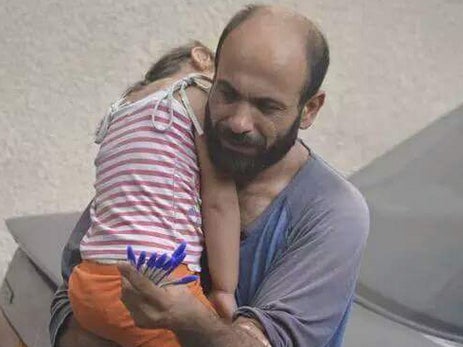Abdul Halim Attar, a Palestinian-Syrian refugee from Yarmouk, has become the latest viral sensation to hit the Internet. A single father of two, he was photographed with his daughter slung over his shoulder, selling biros in the streets of Beirut. An activist found him, set up a crowdfunding page for him, and has now raised over $150,000. On the face of it, such outpourings of compassion demonstrate the collective power of the Internet – of humans helping each other out.
But why does it take a moving photo for us to care enough about migrants to help them? Stories like Abdul’s are not uncommon. His plight is echoed in millions of people across the region and across the world. In Lebanon alone, Syrian refugees make up 1.2 million of a roughly 4.5 million population. Indeed Lebanon has more refugees per capita than any other nation in the world (hear that, Europe?).
Lebanon has no formal refugee camps, and beggars and street children are a common phenomenon. In Jordan, the Zaatari refugee camp houses over 80,000 Syrian refugees with the camp rapidly becoming a permanent settlement. In fact, one in five Syrians are now refugees, according to the UN. All these numbers represent individual lives – lives we will never hear of nor see. What about those displaced people who are systematically ignored, marginalized and unheard?
Last Friday, 71 decomposing bodies were found in a lorry on an Austrian motorway – including that of a baby girl. People keep drowning in the Mediterranean, while those "fortunate" enough to arrive in Italy or Greece are treated with contempt and violence. My Palestinian-Syrian cousin died on a migrant boat from Turkey to Greece last year. They are not humanised and their deaths are not remembered. But would they be if we could just have a photo of them, mid-plight?
My point is not to detract from Abdul’s predicament, but rather to emphasise that in many cases, refugees face dire conditions and are almost universally ignored. The sensationalism of social media is such that charity now manifests itself in neatly packaged bitesize narratives with the true context often being sidelined. These sorts of campaigns feed into the "warm glow" theory of charity – whereby people’s compassion becomes a way for them to feel better about themselves. Indeed I would go so far as to say they actually redirect valuable resources away from charities that could have a more effective impact. Why is it up to them to be the financial arbiters?
The inevitable and uncomfortable question we must ask ourselves is this: does every refugee need their own crowdfunding campaign in order to warrant our sympathy and, by extension, our help? Abdul, on an individual level, is a fellow human in a tragic situation. When his fate is multiplied by a million, refugees become mere numbers lacking both context and compassion. So dehumanized that heads of state can refer to them as a "swarm". In other words, as far as the public psyche is concerned, "migrants" will continue to be undesirable and unwanted unless they have proved themselves worthy of help through emotive images and reductive narratives.
It is entirely random that Abdul and his family have, literally overnight, been given a shot at a normal life. It left me wondering: what would have happened if this man had been selling pens on a different street, out of sight of the photographer? Odds are he would still be invisible to the world, punished by its politics. What about those without activists to share their story on Twitter? Those who will continue to die in the Mediterranean, in detention centers, in the Channel Tunnel, in trucks and boats and camps?
It should not take a viral image to make us care. It should not take a viral image to make us understand the travesty of the civil war in Syria nor the injustice of the occupation of Palestine. And fundamentally, it should not take a viral image to make us understand the hypocrisy of our generosity: there are a million other Abduls walking the streets from Calais to Beirut and they will constantly be overlooked and neglected so long as we require verification of their hardship. I am glad Abdul and his two children have been helped, but viral images can only go so far. Put simply, until the international system affords the other millions of refugees half the humanity, they will continue to sell biros in the streets.




Join our commenting forum
Join thought-provoking conversations, follow other Independent readers and see their replies
Comments